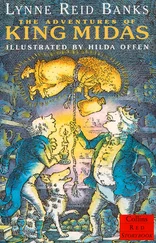Glyn Iliffe - King of Ithaca (Adventures of Odysseus)
Здесь есть возможность читать онлайн «Glyn Iliffe - King of Ithaca (Adventures of Odysseus)» весь текст электронной книги совершенно бесплатно (целиком полную версию без сокращений). В некоторых случаях можно слушать аудио, скачать через торрент в формате fb2 и присутствует краткое содержание. Год выпуска: 2009, ISBN: 2009, Издательство: Macmillan Publishers UK, Жанр: Старинная литература, на английском языке. Описание произведения, (предисловие) а так же отзывы посетителей доступны на портале библиотеки ЛибКат.
- Название:King of Ithaca (Adventures of Odysseus)
- Автор:
- Издательство:Macmillan Publishers UK
- Жанр:
- Год:2009
- ISBN:9780230744486
- Рейтинг книги:3 / 5. Голосов: 1
-
Избранное:Добавить в избранное
- Отзывы:
-
Ваша оценка:
- 60
- 1
- 2
- 3
- 4
- 5
King of Ithaca (Adventures of Odysseus): краткое содержание, описание и аннотация
Предлагаем к чтению аннотацию, описание, краткое содержание или предисловие (зависит от того, что написал сам автор книги «King of Ithaca (Adventures of Odysseus)»). Если вы не нашли необходимую информацию о книге — напишите в комментариях, мы постараемся отыскать её.
King of Ithaca (Adventures of Odysseus) — читать онлайн бесплатно полную книгу (весь текст) целиком
Ниже представлен текст книги, разбитый по страницам. Система сохранения места последней прочитанной страницы, позволяет с удобством читать онлайн бесплатно книгу «King of Ithaca (Adventures of Odysseus)», без необходимости каждый раз заново искать на чём Вы остановились. Поставьте закладку, и сможете в любой момент перейти на страницу, на которой закончили чтение.
Интервал:
Закладка:
‘I’d expect no less,’ Eperitus commented, joining him. ‘If the best warriors in Greece can’t spear a couple of boars, then who can?’
The Myrmidon laughed. ‘Just as long as they aren’t trying to spear each other, that’s all I care about.’

The great hall of the palace at Sparta dwarfed Laertes’s throne room back on Ithaca, easily accommodating the hundreds of guests and slaves who were busy with the night’s feast. At its centre were four painted columns of wide girth, supporting a ceiling so high that it was almost lost in shadow. A great pall of smoke gathered there from the central fire, curling about the rafters like a serpent upon the branches of a tree.
Every room in the palace complex was clean, roomy and magnificently decorated. The walls abounded with an endless variety of animals, birds, fishes and plants, skilfully depicted in vibrant colours that made the creatures seem alive as they stalked each other between bushes and trees, lakes and rivers. But these were only the commonplace designs, used to enrich the hundreds of functional rooms that filled the palace. The more important rooms such as the great hall and the royal quarters were decorated with scenes from legendary battles or stories concerning the gods. Some pictured mythical creatures, whilst others showed human figures at work or play: there were naked boys running foot races; others wrestling or boxing; yet more competing with javelin or discus. It was a place of such wealth and luxury that the halls of Olympus itself would have struggled to surpass it.
The hunters’ return had filled the palace with the hubbub of many people. Odysseus kept his men confined to their rooms on the upper floor, but outside they could hear the many kings and princes disperse to their separate quarters to bathe and put on fresh clothing. Only when Clytaemnestra, still dressed in black, came to bid them join the feast at her father’s request did the Ithacans leave and descend the broad steps to the floors below.
Filing out across the central courtyard towards the entrance to the great hall, they passed the carcasses of scores of bullocks, sacrificed to bring the blessings of the gods and feed the many revellers whom the four or five roasted boar would not. The blood ran down in thick rivulets across the muddy floor and gathered in pools of deep red. The smoke from the burned thigh-bones and fat which the priests had offered up to the gods choked the air and put a pall over the face of the early evening moon.
Before Odysseus and his men had even left their rooms the sound of the feasting had been like the hum of ten thousand bees in their ears, but as they stepped into the great hall the full force of it burst upon them like a roaring sea. Wine-lubricated tongues fought to gain ascendancy over each other as well-fed, big-voiced men shouted to be heard by their neighbours amongst the drunken cacophony. Laughter, music, excited voices, arguments and shouts from one side of the room to the other filled the air, and the babble of sound was matched by the chaos of movement. For each guest there must have been two slaves, rushing here and there with kraters of wine, baskets of bread, platters of meat and small tables on which to set them; unarmed warriors leaned across each other in vociferous debate or lolled about arm in arm, seeking either wine or women amongst the busy slaves; there were stewards and squires chasing the servants or running after their noble masters, and the whole chaotic scene moved with an instinctive, flowing rhythm that sucked the Ithacans in and dragged them inevitably towards its natural vortex.
Suddenly a man appeared from the milling crowds. ‘Lord Odysseus? Tyndareus and Icarius, kings of Sparta, invite you to join them.’ He pointed across the low flames of the hearth to a group of men seated together at the far end of the hall. They were locked in conversation, and paid no heed to the new arrivals. ‘Food and wine is being prepared for your men, if you will follow me.’
While the others were taken to a cluster of vacant chairs guarded by three slaves, Odysseus skirted the fire and walked up to the group of kings and princes that the chief steward had indicated. As his party sat and drinking bowls full of wine were pressed into their hands, Eperitus could not help but watch his leader as he stepped proudly up to the most powerful men in Greece and stood before them until, one by one, they stopped talking and looked at the newcomer. Never in all their trials together had Eperitus felt so anxious for him.

‘I am Odysseus,’ he began, his voice even but audible amidst the din. ‘My father is Laertes, king of Ithaca. I have heard that King Tyndareus is inviting suitors for his daughter, Helen, and I have faced many hardships to come here and name myself amongst them.’
For a while they looked at him, silently observing his ungainly bulk, poised awkwardly on his short legs, and noting his drab clothes and plain looks. But whatever his outward appearance they, more than any others in that vast room, were able to distinguish the noble look in his eyes and sense, as if they could smell it, the royal blood in his veins. The oldest and largest amongst them stood, a man whose strong presence was not due merely to his solid gut and wild black beard.
‘I’m King Tyndareus,’ he said. Despite the noise he did not need to raise his voice to be heard. ‘You wear the signs of your travels, though any man can see you aren’t of low birth – only a fool would judge a man’s character by the quality of his clothing. You are welcome here, Odysseus, son of Laertes, and I don’t need to remind you that you are amongst exalted company.’ The king briefly named the dozen or so men who sat on either side of him, whose reputations and lineage were for the most part well known by all Greeks. ‘Now, sit between Agamemnon and me and give us the story of your journey. It’ll interest us to set your tale against our own adventures on the hillsides this day.’
A slave brought a high-backed chair and placed it between Tyndareus and Agamemnon, who scraped his own chair reluctantly to one side. Odysseus took his seat under the cold, appraising stares of the dozen or so high nobles from states infinitely more powerful than his own. These were the men who, if anybody could, would help him save Ithaca from Eupeithes’s clutches. It was for their power and not the beauty of a girl that he had marched across the Peloponnese. Unless he was at his most persuasive now, his home, his family, his position and his renown would all be lost. So he gripped the arms of his chair and looked at the stone floor for the space of a breath, before raising his eyes to the faces of the company he had been invited to share.
Tyndareus returned his gaze in a friendly enough manner, but beside him Agamemnon remained reserved and neutral, allowing nothing of his true self to show in his eyes. His outward appearance suggested a man obsessed with detail: his white tunic was immaculate; his blood-red cloak perfect; his few adornments opulent but not excessive; his auburn hair and beard long but neatly trimmed. Power and majesty resonated from him, and yet in his practised reserve there was a deliberate, well-trained masking of the passions that burned within. Agamemnon was not a man to expose his strengths, weaknesses, thoughts or ambitions to anyone without need. But when he chose to draw away the screen, the man beneath was driven, quick and uncompromising. He had not become the most powerful man in Greece by birthright alone.
For all that, Odysseus instinctively identified something of himself in the king of Mycenae – a leader’s natural insecurity and desire for control. Though he was unsure whether he liked Agamemnon, he sensed a mutual admiration that he hoped would turn to friendship.
Читать дальшеИнтервал:
Закладка:
Похожие книги на «King of Ithaca (Adventures of Odysseus)»
Представляем Вашему вниманию похожие книги на «King of Ithaca (Adventures of Odysseus)» списком для выбора. Мы отобрали схожую по названию и смыслу литературу в надежде предоставить читателям больше вариантов отыскать новые, интересные, ещё непрочитанные произведения.
Обсуждение, отзывы о книге «King of Ithaca (Adventures of Odysseus)» и просто собственные мнения читателей. Оставьте ваши комментарии, напишите, что Вы думаете о произведении, его смысле или главных героях. Укажите что конкретно понравилось, а что нет, и почему Вы так считаете.










